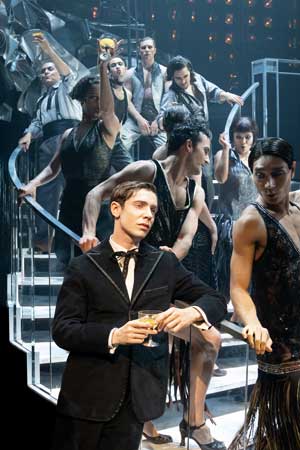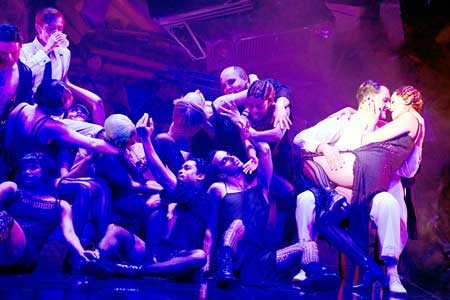Musical (2024)
Based on the novel by F. Scott Fitzgerald
Music by Florence Welch and Thomas Bartlett
Lyrics by Florence Welch
Book by Martyna Majok
Music Supervision by Kimberly Grigsby
Choreographed by Sonya Tayeh
Directed by Rachel Chavkin
American Repertory Theatre
Loeb Drama Center
Harvard Square, Cambridge, MA
May 26 – August 3, 2024
Orchestrations and Arrangements by Thomas Bartlett; Additional Orchestrations by Sally Herbert, Thomas Burhorn; Choreographed by Sonya Tayeh; Scenic Design: Mimi Lien; Costume Design: Sandy Powell; Lighting Design: Alan C. Edwards; Sound Design: Tony Gayle; Hair and Wig Design: Matthew Armentrout; Music Director: Wiley DeWeese
With Isaac Powell (Gatsby), Ben Levi Ross (Nick), Charlotte MacInnes (Daisy), Cory Jeacoma (Tom), Solea Pfeiffer (Myrtle), Matthew Amira (Wilson), Eleri Ward (Jordan), Adam Grupper (Wolfsheim), Ensemble: Nick Bailey, Kailey Boyle, Runako Campbell, Jada Clark, Joshua Grosso, Alex Haquia, Gabriel Hyman, Matt Kizer, Lorenzo Pagano, Chris Ralph, Christopher M. Ramirez, Shea Renne, Aliza Russell, Shota Sekiguchi, Maya Sistruck

with members of the ensemble
in “Gatsby”
Photo: Julieta Cervantes
Courtesy of American Repertory Theatre
Set among the gentry in a fictional town on the north shore of Long Island, the story features Daisy (Charlotte MacInnes) and Tom (Cory Jeacoma) who are married, unhappily. Across the way is Gatsby (Isaac Powell), whom, it turns out, had been in love with Daisy several years before and who still longs for her. Tom philanders with Myrtle (Solea Pfeiffer), who is from the working class and is married to George Wilson (Matthew Amira), a good-natured and devoted husband, but not financially endowed. Nick (Ben Levi Ross) enters the scene as an onlooker, serving as a friend to Gatsby and narrator. Things come to no good pass, with misaligned affections driving tragic outcomes.
This effects-heavy production features all kinds of outsized features. There is a huge and elaborate set (scenic design: Mimi Lien) which holds up the orchestra of fifteen or so and provides ambulatory support for the large omnipresent ensemble. Lights (lighting design: Alan C. Edwards) flash and glare not only on stage but outwards to stun the audience, quite often.
There are a lot of songs in this show – roughly twenty-four of them. The tonality of most of them (music by Florence Welch and Thomas Bartlett) is similar, taken from fairly standard contemporary musical theater idioms, and the lyrics ( by Florence Welch) are very straightforward and often are repeated quite a bit within each song.
Some of the voices in the show are quite good. Ben Levi Ross as Nick, Isaac Powell as Gatsby, Charlotte MacInnes as Daisy and Solea Pfeiffer as Myrtle all get to hold forth individually as vocalists, sometimes with quite good results. Matthew Amira’s Wilson is excellent, both as a singer and as an actor. When he gets, at odd intervals, to speak his part, the effect is convincing, compelling, and heart-rending.
There is, among much the non-sung parts of the show, a tendency for many of the actors to sound as though they are acting rather than inhabiting their roles, coming across, in many cases, as distant, indirect and put-on. This is widespread enough in the production that it strikes one as an effect that director Rachel Chavkin might have intended as a means to evoke a sense of the alienation of the society which the characters inhabit.

Solea Pfeiffer as Myrtle
with members of the ensemble
in “Gatsby”
Photo: Julieta Cervantes
Courtesy of American Repertory Theatre
There is dancing (choreography by Sonya Tayeh), some of which is persuasive. For some reason, there are quite a few cross-dressed men in the ensemble, perhaps intended to be evocative of Nick’s ambiguous sexuality. Though at one point Nick is shown kissing a man passionately, nothing else about his sexuality is developed afterwards, which makes those suggestions less compelling than they might be.
Indications are that this is likely to be one of the series of productions that the ART has in recent years cultivated with the seeming intent to go to Broadway. The staging is large-scale and industrial strength. The opening night audience seemed to love it, rising with explosive enthusiasm at the end. No doubt this big and brassy production, based on the literary classic which recently entered the public domain, unimpeded by somewhat more subtle and nuanced forms of invention, will ride a big wave to commercial success.
Overall: Brash staging and production values including repeated and unnecessarily invasive lighting, some great but some oddly remote acting, standard-issue Broadway style music with lyrics dependent on considerable repetition, some interesting choreography amid some less so, with some swaths of quite decent singing.
– BADMan (aka Charles Munitz)
Leave a Reply